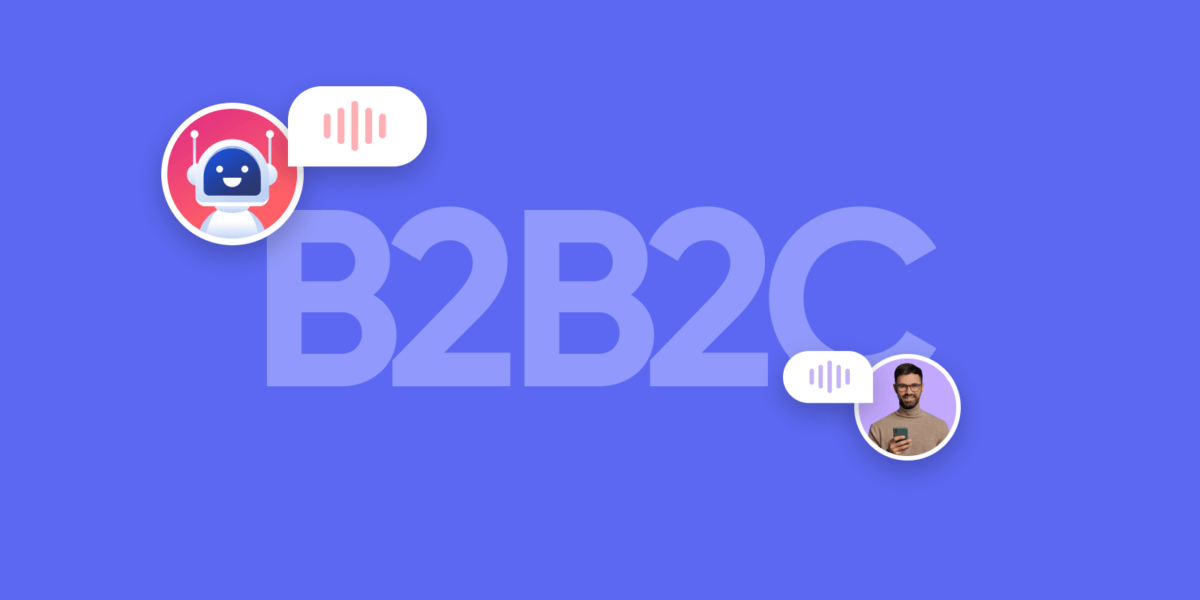Voice AI Call Platform for Streamlining Business Engagement
- March 19th, 2025 / 5 Mins read
-
 Aarti Nair
Aarti Nair

Voice AI Call Platform for Streamlining Business Engagement
- March 19th, 2025 / 5 Mins read
-
 Aarti Nair
Aarti Nair
Last week, Raj received a call about his pending loan payment. The voice on the other end was polite, patient, and even adjusted its tone when he asked for more details. It was only after a few minutes that Raj realised he wasn’t speaking to a human but an AI voice assistant for businesses.
AI-powered voice assistants are changing the way companies handle customer interactions. A research predicts that AI-based voice assistants will handle over 50% of business calls by 2026. From loan collections to appointment reminders, these systems help businesses engage with customers faster and more efficiently.
Numerous enterprises are deploying voice assistants in their support teams. Another report says there will be 8.4 billion units of voice assistants in 2024.
But how do they balance automation with the need for real human connection?
Let’s explore how a Voice AI call platform can streamline business engagement while keeping conversations natural and effective.
Table of Contents
- What is a voice assistant?
- Why do we need a voice assistant?
- Use cases of a voice assistant in B2B2C businesses
- Voice assistants: B2C and B2B Use Cases
What is an AI Voice Assistant?
AI Voice Assistant is a software that brings together AI and machine learning to recognise human voices and perform tasks as per the user’s voice command. It listens to the user’s voice, interprets them, and takes action.
The AI-based technology offers innumerable integration solutions and advanced machine learning capabilities, making them capable of offering customer experience with a maximum human touch.
Suggested Reading: Voice Assistant vs Voice Chat vs Voicebot
The Emerging Need for AI voice Assistants for Businesses and The Reasons
From supporting your existing customers to attracting new customers, Voice Assistants are much needed in today’s businesses. Let us see how.
1. Enable a highly engaging user experience
Voice Assistant provides a conversational interface to the users where they speak to the application naturally and get the work done. Users can command the application for whatever they want without lifting a finger.
And that makes the technology suitable for every age group. Users do not have to be digital natives to figure it out. The Voice Assistant offers an engaging and smooth user experience for everyone.
2. Offer 24/7 support without the cost
For any business, customer satisfaction and retention are paramount. Yet keeping support staff up and running round the clock can be costlier.
That being the case, many companies have provided 24/7 support via FAQs and knowledgebase articles containing considerable information in the form of self-service. But it overwhelms customers when they have so much information for a single problem. It can be tiresome and time-consuming.
Having a voice device like a voicebot makes a tremendous difference. The technology offers solutions, skips past multiple-choice menus, and guides the user through the problem. It simply asks a list of questions and provides the best assistance.
3. Personalise your app experience for every user.
Whatever the application workflow, Voice Assistant can provide a personalised user experience. Voice Assistant can understand the voice and visual context of the application and respond as per the user’s requirement. This means the Voice Assistant responds to the users according to their language, locality, and preferences.
4. Improve team efficiency
In a business, Voice Assistant can help remember dates and deadlines of importance, schedule an appointment, keep relevant information updated, and more.
And when the employees are loaded off with such tasks, they get more time to be productive on other crucial tasks, increasing team efficiency.
With AI innovation and deep learning integration, Voice Assistants work incessantly. They access reports, examine data, and keep the systems updated. As a result, your business experiences seamless daily operations.
5. Remove language barrier
Voice Assistant helps your business deal with customers speaking any language as Voice Assistant technology integrates with translation services.
For instance, Google Assistant supports over 40 languages and has users worldwide. Just like that, if you integrate Voice Assistant technology within your business, customers can interact with your brand in the language they’re most comfortable with. It leads to a smooth customer experience.
Use cases for AI Voice Assistants for Businesses in different spheres
Let’s look at some popular uses of voice assistants and how they’ve transitioned as functional tools into businesses and daily life.
Use Cases for AI Voice Assistants in B2C Companies

1. Smart speakers
There are several use cases of smart speakers for B2C audiences. Many devices like Alexa and Google home are commonly used for entertainment, making calls, sending messages, and more while you’re busy driving, cooking, and doing other work.
Not just that, customers are using Voice Assistant for product research and making a purchase. The Voice Assistant assists the customers in searching for items, adding them to carts, and proceeding to checkouts.
2. Smart appliances
Other than smart speakers, Voice Assistant technology can also be used in kitchen appliances, lights, home security, and vacuum cleaners.
With a single voice command, you can activate appliances, start the cooking and laundry process, and save time for other things.
3. Smart cars
Today, several car companies like Honda, Toyota, and Dodge are equipped with a voice-activated command that takes a driving experience to the next level. Like other smart devices at home and businesses, deep integration with Apple CarPlay and Alexa allows voice-activated control to navigate the road, play music, switch on air conditioning, etc. Hence you can have comfortable driving without taking your eyes off the road.
Use Cases for AI Voice Assistants in B2B Companies
1. IT help desks for self-servicing employees
The primary function of the IT help desk is to monitor activities, address user requests, and provide a unified communication channel between different service management functions within the organisation.
Voice Assistant automates repetitive work of the help desk and reduces stress on live support agents remarkably. The employee can access the service 24/7.
2. Voice payments
The finance industry has been implementing voice payments to enable customers to interact effortlessly with their finances. The multi-factor authentication powered by voice and biometrics can detect the actual end user and prevent fraud.
The inclusion of voice payment has made banking convenient and more accessible. Consumers can make a purchase online and make a payment using their voice.
3. Collecting feedback and developing a strategy
Voice assistants are very useful in gathering information through surveys. The NLP-enabled assistants are powered by Natural language processing technology that understands human responses.
The NLP helps businesses design short surveys to gather customer feedback efficiently, reducing the nonresponse and survey abandonment rate.
Thereby brands use them to follow up with the customers with relevant questions eliminating the need for filling out paper and digital forms.
4. Advertising and marketing
eCommerce industries can make the most out of voicebot. Most users share precisely what they are looking for and what they are thinking with Voice Assistant.
It helps marketers to offer personalised solutions with what they need.
Also, suppose the customers are at the point where they are ready to buy. In that case, the Voice Assistant can deliver promotional campaigns like instant digital coupons to entice customers, Potentially encouraging the customers to complete the purchase.
How Does Verloop.io’s voice AI Assistant Solve the Problem of One-way Interaction?
All of us are familiar with phrases like
“Hey Siri, send a message to mom.
Alexa, play the music
Hi Bixby, the weather today.”
These voice AI assistants are very comfortable for personal use. We use them in our everyday lives to make simple tasks quicker and easier. But how many times have you asked Siri or Alexa a question, and the answer has been entirely irrelevant to your questions?
This does make one question if they’re genuinely suitable for businesses!
The answer is most likely negative. That’s because customers are unpredictable and go through prolonged interactions before deciding. That makes a two-way interaction an immediate need for businesses. And voice assistants like Siri, Alexa, and Bixby are not designed to hold ongoing conversations. Their fatal flaw also lies in their inaccuracies in identifying the nuances of different voices!
Verloop.io’s Voice ai Assistant is designed to offer a seamless two-way interaction that is inbound call automation and outbound call automation. It is capable of holding long and complicated conversations with human-like responses. It also handles interruption and questions, background, and patchy connection, while still understanding the intent.
Want to automate your support queries seamlessly using a voice assistant? Talk to our experts and get a knack for Verloop’s unfaltering Customer Support Strategy.
Schedule a demo today to learn more!
FAQS
1. How does a Voice AI call platform improve business communication?
A Voice AI call platform automates inbound and outbound calls, helping businesses handle large call volumes efficiently. It ensures faster responses, reduces wait times, and provides a seamless customer experience by integrating with CRM systems for personalised interactions.
2. Can AI voice assistants handle complex customer queries?
Yes, AI voice assistants for businesses can understand and respond to complex queries using natural language processing (NLP) and conversational AI. They can provide relevant information, answer FAQs, and transfer calls to human agents when necessary.
3. What industries benefit the most from AI voice automation?
Industries such as finance, healthcare, e-commerce, and telecom benefit significantly. Businesses use Voice AI for tasks like appointment scheduling, loan collections, customer support, and order tracking to improve efficiency and engagement.
4. How secure is a Voice AI call platform for handling customer data?
Leading Voice AI platforms comply with industry standards and regulations such as GDPR and PCI-DSS. They use encryption, authentication protocols, and access controls to protect sensitive customer information.
5. What are the key metrics to track the success of Voice AI automation?
Businesses measure success using metrics like call resolution rate, average handling time, customer satisfaction scores (CSAT), and conversion rates. AI-driven analytics help refine scripts and improve engagement strategies over time.
6. How does inbound voice call automation improve customer service for businesses?
Inbound voice automation helps businesses handle high call volumes efficiently by answering common queries, routing calls to the right department, and providing self-service options. This reduces wait times and ensures customers get quick and accurate responses.
7. Can AI voice assistants personalise outbound calls for customers?
Yes, AI voice assistants for businesses can personalise outbound calls by using CRM data. They can address customers by name, reference past interactions, and adjust their tone based on the conversation context, making interactions feel more natural.
8. How do AI voice assistants ensure compliance in outbound calls, such as loan collection?
AI voice assistants follow predefined scripts and regulatory guidelines, ensuring that all customer interactions adhere to compliance standards. They can also record calls, provide automated disclosures, and escalate cases to human agents when needed.






